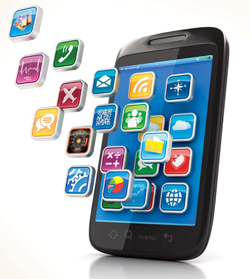Business Goes Mobile

Want to improve your business? There's an app for that.
By Cathy Wilde
Five years ago, the iPhone hit the market and changed how people viewed the cellphone. Three years later, the iPad brought tablet computing to the mainstream. And while many people view these gadgets and others like them as handy ways to watch movies on the go or play Angry Birds, businesses are using mobile technologies to become more productive, more responsive and, most important, more profitable.
While cellphones and other wireless technologies have been around for years, smartphones and tablets have taken the mobile aspect of computing to a whole new level.
"Mobile has become part of the ecosystem," says H.R. Rao, SUNY Distinguished Service Professor in the School of Management's Management Science and Systems Department. "From impacting the social system in real time, to mobile commerce, it is probably the fastest-growing technology of the century."

"Mobile devices are tools of extraordinary potential that have the ability to provide companies with incredible amounts of information."
H.R. Rao, SUNY Distinguished Service Professor
Management Science and Systems Department
He cites a recent Pew research survey showing that nearly half of all U.S. residents have smartphones. For individuals age 18 to 34, that number is nearly 70 percent.
In fact, in 2011, more smartphones were sold than personal computers. This should come as quite a shock to Ken Olsen, founder of Digital Equipment Corp., who famously said in 1977, "There is no reason for any individual to have a computer in his home." Today's individual doesn't want a computer just in his home-he wants it in his pocket.
So, what does this mean for business? Plenty.
"Mobile devices are tools of extraordinary potential that have the ability to provide companies with incredible amounts of information," Rao says. "They can show where people are, where they are going to be, where they have been and who they know."
The mobile revolution is impacting business in numerous ways, such as staffing, supply chains, entrepreneurship and marketing. Perhaps the biggest impact is in how wireless technologies have made the world smaller.
Global Impact
Christopher Beckage '96 is vice president, north region, for Superior Group, a staffing, workforce management and outsourcing solutions company with 60 locations in the U.S. and around the world, including Canada, the United Kingdom, China and India.

"With Skype and FaceTime, we can easily have meetings, conduct interviews and build rapport with each other."
Christopher Beckage '96
Vice President, North Region, Superior Group
He cites a recent Pew research survey showing that nearly half of all U.S. residents have smartphones. For individuals age 18 to 34, that number is nearly 70 percent.
"When I started with Superior 15 years ago, interacting with our domestic and international offices was strictly a phone call where it was difficult to build rapport," he says. "Now, with Skype and FaceTime, we can easily have meetings, conduct interviews and build rapport with each other. Our India offices are nine and a half hours ahead of us, but we are communicating frequently. We can share data at any time, which is important since our business is about urgency and response time.
"We treat our India operation like they are sitting in the office right next to us," Beckage says.
In addition to cutting down on the cost and time involved with travel, Beckage says Superior is more cost-effective when training employees and consultants. "Much of our training is by webinar, so we can have one person conducting a training session for individuals at 20-plus locations at the same time."
But when it's necessary to travel, Beckage says his smartphone is his best friend. "I use airline apps to manage my flights, OpenTable to make dinner reservations in any city, and I have my entire address book with me. It lets me be much more efficient."
Other business travelers agree. A recent survey sponsored by Rearden Commerce found that 75 percent of business travelers claim that using mobile devices increases their productivity.

"In many parts of the world, the first and sometimes only connection to the Internet will be through someone's cellphone."
Jim Lederer '82, MBA '96
Executive Vice President and General Manager, Qualcomm
He cites a recent Pew research survey showing that nearly half of all U.S. residents have smartphones. For individuals age 18 to 34, that number is nearly 70 percent.
The wireless revolution is bringing technology to places that previously had none, says Jim Lederer '82, MBA '96, an executive vice president and general manager for global telecommunications giant Qualcomm. "In many parts of the world, the first and sometimes only connection to the Internet will be through someone's cellphone," he explains.
The technology is helping small businesses throughout the world become more profitable.
"For instance, farmers in rural India, where the trading market can often be a full day's commute from their properties, would leave their homes with no idea of the price of goods that they would encounter when arriving, and subsequently, no idea of their ability to turn a profit," Lederer says. "Now, with the use of even just a low-tier smartphone device, they can have access to local commodity pricing for their rice, wheat, vegetables, etc., prior to leaving home."
Another example Lederer notes is fisherman in the Bay of Bengal. "They can now get detailed X-Y coordinates regarding the movement of schools of fish in the local vicinity through their cellphones, so they can cast their fishing nets with much higher probability of a successful haul," he says.
Getting from Point A to Point B
Mobile technology has revolutionized supply chain operations, according to Nallan Suresh, UB Distinguished Professor and chair of the Operations Management and Strategy Department.
"Mobile technologies are being used all across the links to remote suppliers, transportation networks, warehousing, distribution and retail," he says.
The use of hand-held devices such as smartphones, tablets and scanners helps ensure data and inventory accuracy and makes operations much more efficient, he says. For example, technologies have been in place for several years now that not only scan inventory as soon as it is put on the trucks heading for a retail store, but also alerts the store that the inventory is on its way.

"Mobile technologies are being used all across the links to remote suppliers, transportation networks, warehousing, distribution and retail."
Nallan Suresh, UB Distinguished Professor and Chair
Operations Management and Strategy Department
"In the warehouse and on the road, workers always have the most up-to-date data," Suresh says. "It drastically reduces lead time and helps businesses be more responsive." Retailers can know exactly what is on their shelves, in the stockroom and on the road at any given time, helping them to better serve their customers.
"There are also green benefits as businesses become more environmentally friendly by going paperless throughout every step of the supply chain," he says.
Helping Businesses Help Other Businesses
Of course, businesses are not just using mobile technologies to make themselves more productive. There is a huge industry creating the apps, content, operating systems and architecture to make mobile devices do all they can do.
A study by Recon Analytics, authored on behalf of industry trade group CTIA-The Wireless Association, reports that the wireless industry added $195.5 billion to the U.S. gross domestic product in 2011, and projects nearly $1.5 trillion in productivity gains over the next 10 years.

"Customers are clamoring for all access to digital content, and the industry is scrambling to deliver."
Laura Morris, MBA '96
Director of Affiliate Marketing Synacor
"The wireless industry contributes more to America's economic growth than the auto, agriculture, hotel or motion picture industries," says study author and Recon Analytics founder Roger Entner. The report also states that nearly four million U.S. jobs are directly or indirectly created by wireless technology.
A local success story is Synacor, a Buffalo-based company that helps cable, satellite, telecom and consumer electronics companies deliver digital entertainment, services and apps to their consumers. The company was founded in 2000 by School of Management graduate Darren Ascone '98 and UB alumnus George Chamoun '96, who continues to serve as Synacor's executive vice president for sales and marketing.
"Consumers are clamoring for all-access to digital content, and the industry is scrambling to deliver. Synacor helps make it possible," says Laura Morris, MBA '96, Synacor's director of affiliate marketing.
For example, Synacor's technologies support HBO GO, the cable network's entry into the burgeoning "TV Everywhere" trend. "HBO has found that the majority of those using HBO GO also watch even more regular HBO programming," Morris says. "That's an unexpected uptick and a great signal of success. The net result is happier customers and pay-TV providers making even more money per subscription."
In addition to helping the cable industry's bottom line, Synacor itself grows. The company went public in February and has seen record-breaking revenue and growth, with first-quarter revenue for 2012 reported as 64 percent higher than the first quarter of 2011.
Business Boosts, Both Big and Small
There are many global giants in the mobile technology industry, such as Apple, Qualcomm, Verizon, Cisco and others. And then there are people like Scott Falbo, PMBA '07, who has launched a small side business, Front9 Technologies, which makes iPad apps for the legal profession.
"I've focused on legal apps because my wife is an attorney and I've gotten inspiration from some of the challenges she and her colleagues encounter," Falbo says.
The most popular of these apps is called iJuror, which helps attorneys organize and track juror selection information in one consolidated location on an intuitive device.

"Finding areas where technology intersects with more traditional businesses can be very interesting and exciting."
Scott Falbo, PMBA '07
President, Front9 Technologies
"In the past, this was a process that relied heavily on sticky notes that were easily lost or misplaced," Falbo says. "iJuror prevents the need for these materials and keeps track of information over time.
"Finding areas where technology intersects with more traditional businesses can be very interesting and exciting," he says.
Falbo is not alone. Thousands of small businesses have sprung up in support of the mobile industry since the iPhone's launch in 2007. A recent study conducted by the Center for an Urban Future identified 486 new tech companies in New York City alone, and that number includes only the ones that received venture capital or have angel investors.
Some small businesses create new technology, while others benefit from it. Nearly all (96 percent) of small businesses use mobile technology and two-thirds of small business owners said they could not survive without it, according to a 2012 technology poll by AT&T. And it's not just because the workers are using their own smartphones. Even though the technology is only a few years old, two-thirds of survey respondents reported using tablet computers to help manage their businesses.
Up, Up and Away...
And now, business is heading to the cloud.
"Cloud computing," which, in its simplest form, means storing files in cyberspace, is another way that mobile devices are becoming more useful and convenient. Sanjukta Das Smith, assistant professor of management science and systems in the School of Management, explains that more and more apps are moving off mobile devices and into the cloud, accessing data stored on cloud servers. Most Google apps, she notes, are cloud-hosted.
Smith and Ram Ramesh, professor of management science and systems, recently received a $102,000 Google Research Award to study the reliability of cloud computing. The research will be conducted with Chunming Qiao, professor in UB's School of Engineering and Applied Sciences, and Jianping Wang, assistant professor in the City University of Hong Kong.

"Much of the cloud infrastructure is not using top-of-the-line servers, and they tend to fail quite a bit."
Sanjukta Das Smith, Assistant Professor
Management Science and Systems Department
"Much of the cloud infrastructure is not using top-of-the-line servers, and they tend to fail quite a bit," Smith says. "We are coming up with a model that will predict downtime for servers so companies can find ways to compensate, and their customers won't feel the effect."
In addition to the problem of downtime, there can be security concerns when data is moved from a hard drive to shared servers in the cloud.
"With social media meeting mobile phones, we can expect new issues of security, privacy and trust to become important challenges in the immediate future," Professor Rao says.
Nevertheless, cloud computing is a "game-changer" for Synacor, says Laura Morris. "The companies we work with will be able to offer their subscribers all the content they want on not only PCs and Macs, but also tablets, smartphones and even connected TVs," she says. "Consumers will no longer be wed to one operating system, or having to buy apps for each of their different devices. They will be able to access all their apps in one place, on whichever device they choose, whether it's Microsoft, Google Android or Apple iOS."
What's Next?
Recent surveys by the Pew Research Center's Internet and American Life Project suggest that mobile computing will only become more ubiquitous. The next generation of consumers is now growing up with smartphones and tablet computers as the norm.
Twenty-three percent of 12- to 17-year-olds own smartphones. Two-thirds of 4- to 7-year-olds have used an iPhone or iPod. Recently, FCC Chairman Julius Genachowski and Education Secretary Arne Duncan suggested that tablet computers replace textbooks in America's classrooms.
Smart businesses will learn to keep up, or face being left behind.
Rao photo by KC Kratt. Suresh, Morris, Falbo and Smith photos by Tom Wolf.
New technology businesses get a boost from Panasci competition

From left: Robert Genco, vice provost, UB STOR; Arjang Assad, dean, UB School of Management; and winners Andrew Cassetti and Matthew Epstein.
The winners of this year's Henry A. Panasci Jr. Technology Entrepreneurship Competition (Panasci TEC) hope to capitalize on the popularity of mobile apps.
School of Management graduates Matthew Epstein '12 and Andrew Cassetti '12 won first place in this year's Panasci TEC, a competition that awards seed money and business services to the team that presents the best plan for launch of a viable new business.
They won for their business, AppVue, an app that helps users improve their smartphone experience by allowing them to see what apps their friends are using and how they are using them. With the vast and growing number of applications available, AppVue helps users determine which apps are relevant to their needs. AppVue is a service in itself, but it can be used with Facebook to enhance the service.
In addition to $25,000 in start-up funding, AppVue will receive in-kind awards for legal services from Jaeckle Fleischmann & Mugel LLP, accounting services from Kopin & Co. P.C., human resources start-up services from the People Plan by HR Foundations Inc. and office space from North Forest Office Space, bringing the total package to more than $35,000.
Now in its 12th year, Panasci TEC was created by the School of Management and the UB Office of Science, Technology Transfer and Economic Outreach, and is funded with a $1 million endowment from the late Henry A. Panasci Jr. to facilitate and promote the commercialization of UB-generated technologies.
